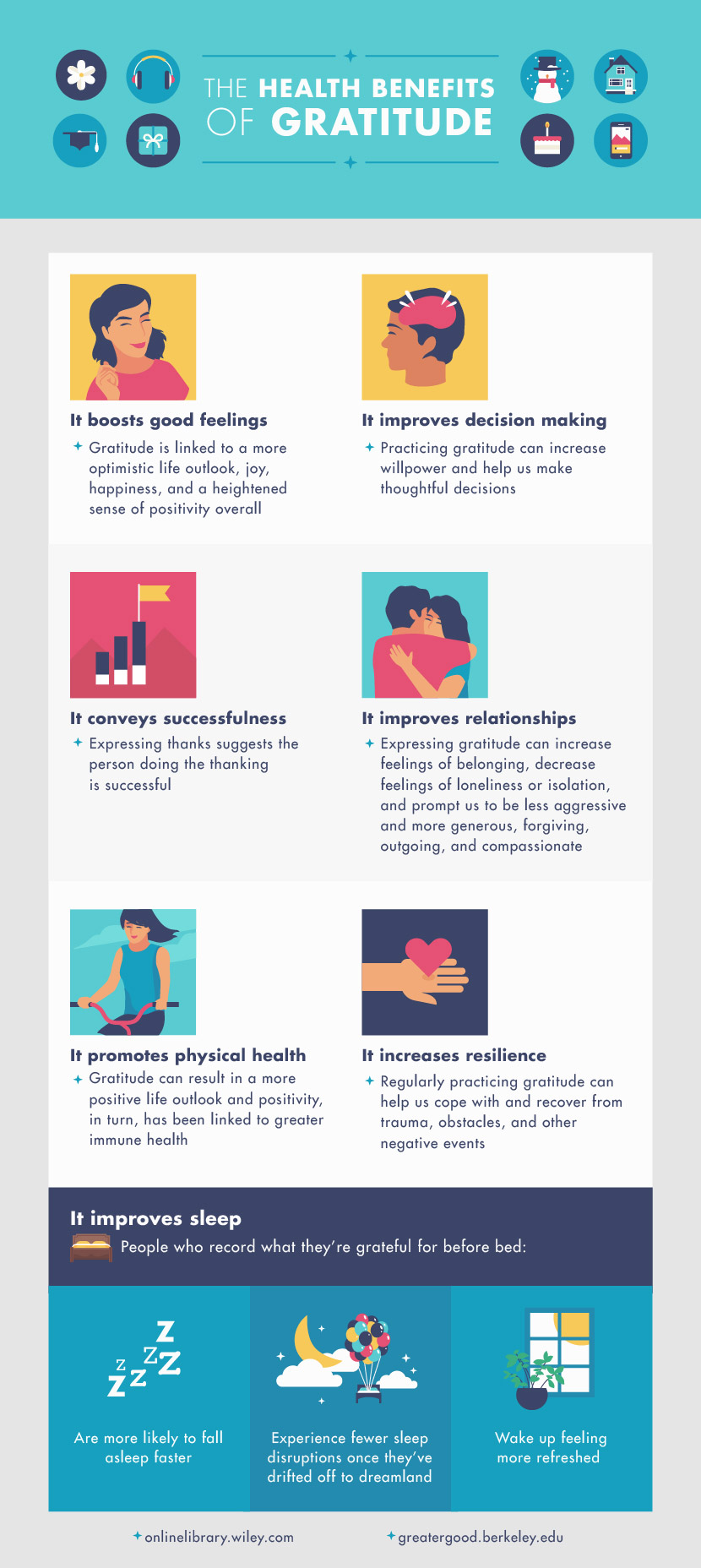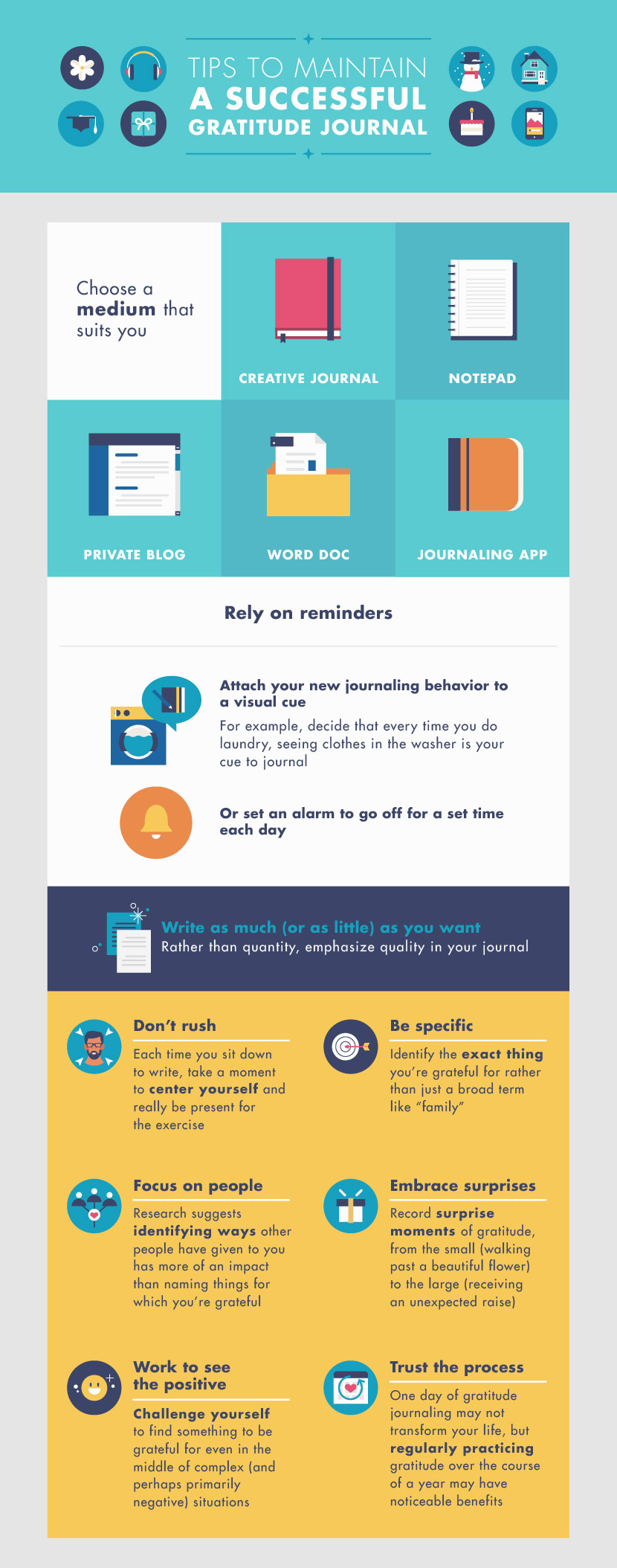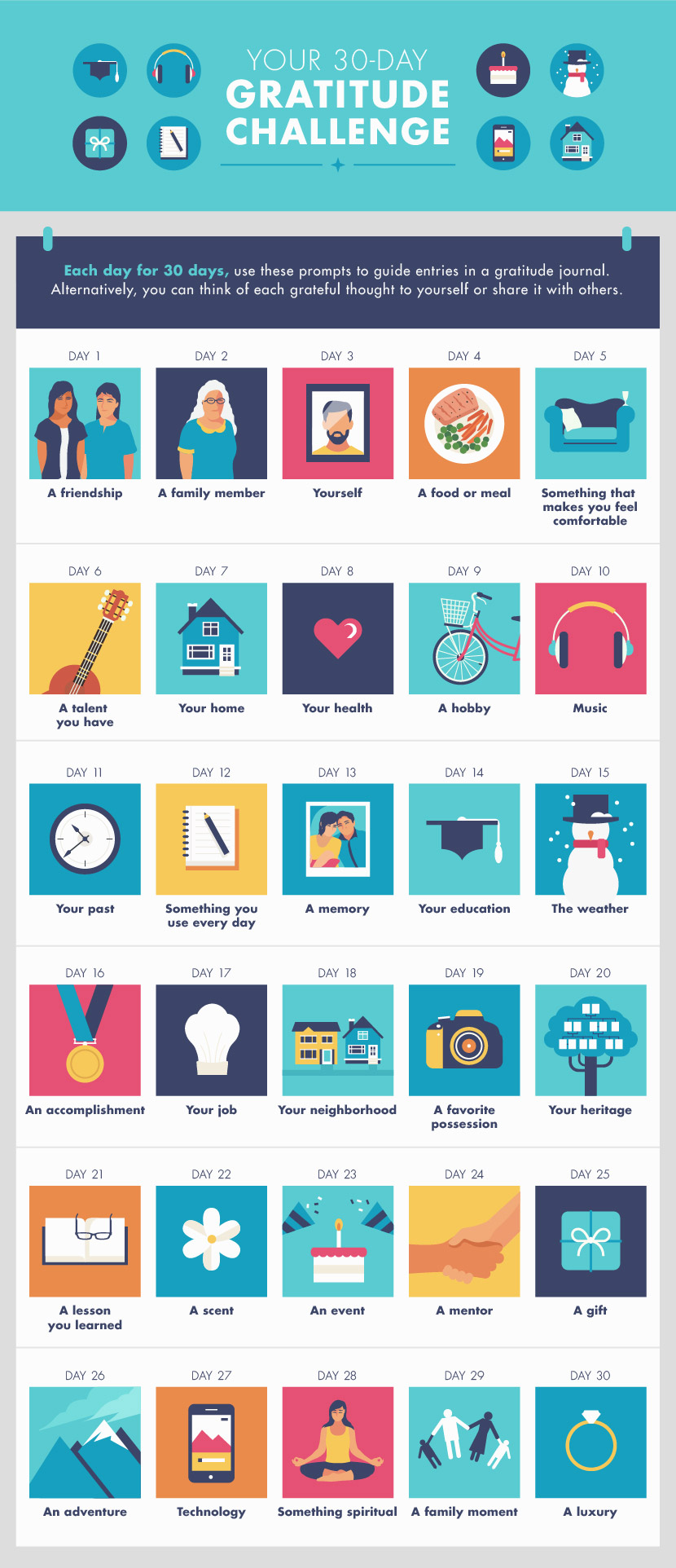Gratitude is Good For Your Health
How Being Grateful Is Good for You
Most of us learned from our elders that we should say “thank you” whenever someone passes the peas at the dinner table or helps us out in some small or big way.
But expressing gratitude has benefits that extend well beyond social convention.
An increasingly large body of research suggests that gratitude can benefit our physical, mental, and social wellbeing in ways large and small.
The best part? The benefits of gratitude are available to everyone - from children through octogenarians and everyone in between.
Here’s what you stand to gain from being grateful.http://greatergood.berkeley.edu/article/item/why_gratitude_is_good/

What is Gratitude and Why is it Good for You?
Gratitude is defined by Psychology Today as “an emotion expressing appreciation for what one has.”https://www.psychologytoday.com/basics/gratitude
According to Robert Emmons, one of the leading gratitude experts, this appreciation consists of two primary elements.
One, it reinforces the idea that there is goodness in our lives and in our world - even when things aren’t perfect.http://greatergood.berkeley.edu/article/item/why_gratitude_is_good/
Two, it requires us to see that this goodness often derives from sources beyond ourselves.
In other words, by expressing gratitude, we realize we benefit from our interconnectedness with other people, places, and things.
Speaking of benefits:
More and more research finds being grateful really is good for us. Here are just some of the many ways that expressing gratitude can improve our health and our lives:
It boosts good feelings
Consistently naming things for which you’re grateful can help you experience more positive emotions in your life.
Specifically, gratitude is linked to a more optimistic life outlook, joy, happiness, and a heightened sense of positivity overall.
At the same time that it increases positive emotions, gratitude can also reduce negative feelings such as depression, envy, resentment, and regret.http://greatergood.berkeley.edu/article/item/why_gratitude_is_good/
It improves decision making
It may sound far-fetched, but practicing gratitude can increase willpower and help us make thoughtful decisions, instead of responding with knee-jerk reactions or the desire for instant gratification.http://www.psychologicalscience.org/index.php/news/releases/can-gratitude-reduce-costly-impatience.html
Similarly, being thanked can improve our decision-making abilities.http://happierhuman.com/benefits-of-gratitude/
So if someone you know is struggling with a big choice, you may be able to help by naming something they do for which you’re grateful.
It conveys successfulness
One survey found that expressing thanks suggests the person doing the thanking is successful.http://greatergood.berkeley.edu/images/uploads/JTF_GRATITUDE_REPORTpub.doc
Meanwhile, communicating gratitude can motivate the “thankee,” so performance improves.http://happierhuman.com/benefits-of-gratitude/
In other words? Expressing appreciation for your coworkers or partners is a great way to ensure they continue to perform at their best. (And the same is true in reverse.)
It improves relationships
Cultivating an attitude of gratitude can make you a better friend.
That’s because grateful people are more likely to feel empathy for people who are struggling and to offer support.http://www.huffingtonpost.com/2014/07/21/gratitude-healthy-benefits_n_2147182.html
More generally, expressing gratitude can increase feelings of belonging, decrease feelings of loneliness or isolation,
and prompt us to be less aggressive and more generous, forgiving, outgoing, and compassionate.http://women.webmd.com/features/gratitute-health-boost http://greatergood.berkeley.edu/expandinggratitude http://www.forbes.com/sites/amymorin/2014/11/23/7-scientifically-proven-benefits-of-gratitude-that-will-motivate-you-to-give-thanks-year-round/#e14532b6800a http://happierhuman.com/benefits-of-gratitude/
Within romantic relationships, expressing thankfulness for the ways your partner supports and cares for you has been linked to positive relationship outcomes.http://www.telegraph.co.uk/women/sex/7756775/Gratitude-for-little-things-is-key-to-relationships.html
It promotes physical health
As mentioned above, gratitude can result in a more positive life outlook—and positivity, in turn, has been linked to greater immune health.http://women.webmd.com/features/gratitute-health-boost
In the same vein, grateful people report feeling less bothered by aches and pains and they’re also more likely to exercise and tend to their physical health needs.http://www.forbes.com/sites/amymorin/2014/11/23/7-scientifically-proven-benefits-of-gratitude-that-will-motivate-you-to-give-thanks-year-round/#e14532b6800a
Gratitude may also lower blood pressure as gratitude practices are now being studied as possible antidotes to hypertension, coronary artery disease, and congestive heart failure.http://greatergood.berkeley.edu/expandinggratitude http://www.ncbi.nlm.nih.gov/pubmed/7484873
Cultivating gratitude may even result in a longer life span.http://happierhuman.com/benefits-of-gratitude/
It improves sleep
Counting your blessings (instead of sheep) before bedtime is a great way to get better sleep.
Research has found that people who record what they’re grateful for before bed are more likely to fall asleep faster, experience fewer sleep disruptions once they’ve drifted off to dreamland, and wake up feeling more refreshed.http://onlinelibrary.wiley.com/doi/10.1111/j.1758-0854.2011.01049.x/abstract http://greatergood.berkeley.edu/article/item/why_gratitude_is_good/
It increases resilience
Regularly practicing gratitude can help us cope with and recover from trauma, obstacles, and other negative events that crop up throughout our lives.http://greatergood.berkeley.edu/article/item/why_gratitude_is_good/
This is probably due to the combination of a number of gratitude’s benefits:
It improves our self-image, helps us feel connected to a support system, increases energy levels, and helps us create positive memories,
all of which contributes to a sense of vitality and resilience.http://www.fastcompany.com/3053843/know-it-all/the-surprising-benefits-of-gratitude http://happierhuman.com/benefits-of-gratitude/ http://happierhuman.com/benefits-of-gratitude/ http://www.forbes.com/sites/amymorin/2014/11/23/7-scientifically-proven-benefits-of-gratitude-that-will-motivate-you-to-give-thanks-year-round/#e14532b6800a
How to Cultivate Gratitude

That’s a pretty impressive list of benefits, right? The good news is that anybody is capable of cultivating gratitude.
One of the easiest ways to do this is to keep a gratitude journal.
Gratitude journals are thought to be particularly effective tools for increasing gratitude because they require us to focus our attention on strengthening grateful thoughts and decrease the chances we’ll take the good things in our lives for granted.http://greatergood.berkeley.edu/article/item/why_gratitude_is_good/
Journaling about gratitude can also develop self-awareness, provide a space in which to express your feelings without judgment,
and give you clarity around the relationships and feelings you want to continue cultivating in your life.http://www.huffingtonpost.com/lauren-jessen/gratitude-journal_b_7745854.html

If you’ve never kept a gratitude journal, don’t be intimidated by the practice or put off by New-Age stereotypes.
Instead, keep the following tips in mind to successfully develop a new habit of gratitude journaling:
Choose a medium that suits you
There isn’t one right way to keep a journal.
Experiment to figure out the medium that works for you, whether it’s a personally decorated journal, a notepad and pen, a private blog, or one of the many apps designed for gratitude journaling.
Finding a medium you enjoy using will make you more likely to stick with the new habit.
Rely on reminders
When starting a new habit, one of the biggest obstacles is forgetting your intention to adopt that new habit. One effective way to address this problem is to attach the new behavior to a visual cue - for example, decide that every time you wash your bed sheets, seeing the sheets in the washer is your cue to record some grateful thoughts.http://greatergood.berkeley.edu/article/item/why_gratitude_is_good/
Alternatively, you can set an alarm to go off whenever you want to write in your journal.
Tailor it to your schedule
A lot of sources advocate for writing in your gratitude journal every night, but that may not work for you if you’re always exhausted before bedtime or you hate having a long nighttime routine.
Experiment with the timing and frequency that best fits your schedule and preferences, and you’re more likely to stick with the new habit for the long term.
There’s no need to push yourself: One study found journaling once a week is ideal.http://www.happify.com/hd/the-science-behind-gratitude/
Alternatively, you can make a habit of jotting down a note every time you notice yourself feeling grateful.http://www.blog.yerdle.com/blog/tips-for-keeping-a-gratitude-journal-1
Write as much (or as little) as you want
Rather than quantity, emphasize quality in your journal. Some days you may be able to think of 10 things you’re grateful for; other days you may just have two.
That’s okay. What matters is that you express authentic gratitude for whatever it is you’re thankful for on a given day.
Don’t rush
Each time you sit down to write, take a moment to center yourself and really be present for the exercise.
Research suggests that setting your intention to feel more positive emotions via gratitude journaling makes it more likely for that intention to come true.http://greatergood.berkeley.edu/article/item/why_gratitude_is_good/
Take the time to center yourself in this intention and really feel the gratitude you’re documenting.
Be specific
Don’t just write down “my family, my dog, and clean water” every day. Instead, really dial in on what makes you grateful each time you write.http://www.happify.com/hd/the-science-behind-gratitude/
For example, instead of “family,” perhaps you could say “Today I felt loved when my son drew a picture for me.”
You don’t have to write a paragraph for every entry, but taking the time to identify the exact thing you’re grateful for can increase the benefits you derive from journaling.
Focus on people
Research suggests identifying ways other people have given to you has more of an impact than naming things for which you’re grateful (e.g. “my house” or “my iPhone”).http://greatergood.berkeley.edu/article/item/tips_for_keeping_a_gratitude_journal
If you’re not sure what to write, try thinking about what other people have brought into your life or provided for you over the course of the past few days, weeks, or months.
Embrace surprises
Research has found that unexpected situations often provoke a heightened emotional response compared to events you’ve come to expect.http://tinybuddha.com/blog/turn-pain-to-joy-11-tips-for-a-powerful-gratitude-journal/
Take the time to record these surprise moments of gratitude, from the small (walking past a beautiful flower) to the large (receiving an unexpected raise).
Work to see the positive
Challenge yourself to find something to be grateful for even in the middle of complex (and perhaps primarily negative) situations.http://www.positivelypresent.com/2011/03/keeping-a-gratitude-journal-to-cultivate-positivity.html
For example, maybe you’re struggling with the end of a relationship, but you can find space to be grateful for the time you have to improve your relationship with yourself.
Trust the process
If you consistently practice gratitude, you will experience some (or maybe even all) of the benefits outlined above.
Start your gratitude practice believing this to be fact, and you’re all but guaranteed to see that belief manifest before your eyes.
Be patient: One day of gratitude journaling may not transform your life, but regularly practicing gratitude over the course of a year just may.
As you work to incorporate more gratitude into your life, remember there is no perfect formula for feeling grateful and deriving gratitude’s benefits.
Experiment with what works for you, be open to gratitude’s magic, and give thanks in ways that feel authentic to you and your life. The rest will take care of itself.
Embed the article on your site

